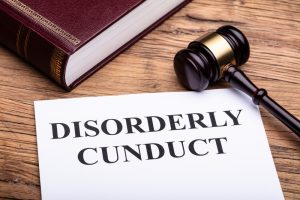Disorderly Conduct Attorneys in Little Falls, NJ
Experienced Attorneys Providing Legal Assistance in Woodland Park, Clifton, Paterson, Wayne and across Passaic County and Northern New Jersey

What is disorderly conduct?
According to New Jersey law, disorderly persons charges – the official term for disorderly conduct – cover a broad range of offenses that carry a minor charge. The types of disorderly persons charges vary, but some of the most common examples include
- creating dangerous public conditions – putting others in danger due to your reckless behavior
- public intoxication – being under the influence of drugs or over the legal alcohol limit in public
- simple assault – this includes actions that cause minimal physical harm, or the threat of harm, to another person
- harassment – sustained communication with or pursuit of a person who does not wish to be communicated with
- vandalism – damage to property that does not exceed $500
- shoplifting – any removal of a store product without paying for it falls under this aspect of disorderly persons offenses
- possession of drug paraphernalia or small amounts of marijuana – having fewer than 50 grams of marijuana in your possession, as well as possessing items typically used with illegal drugs such as pipes, rolling papers, or bongs
This is not an exhaustive list but outlines the most common disorderly persons offenses for which people are charged in New Jersey.
What is the difference between a petty disorderly persons charge and a disorderly persons charge?

Depending on the severity of the action, as well as whether a person has been charged multiple times with a disorderly persons offense, New Jersey law dictates that a disorderly persons offense may carry the charge of petty disorderly persons offense or disorderly persons offense.
These carry different consequences.
Both the petty disorderly persons charge and the disorderly persons charge are handled at the municipal court level and carry up to a one-year maximum in jail.
What are the impacts of a disorderly persons charge?
Disorderly persons charges are offenses, while other, more serious charges are known as crimes. As noted, these offenses are equal to misdemeanors, and while some people think that misdemeanors are not serious, they can have lasting impacts on your legal standing, our lives, and our futures. New Jersey Statutes 2C:1-4 separates the classes of offenses in the state. These statutes differentiate between an offense and a crime and relieve disorderly persons offenses from the ‘criminal’ standing. As the result of being an offense as opposed to a crime, a person charged with a disorderly persons offense cannot be tried by a jury, including indictment by a grand jury. Instead, their case is heard by a municipal court judge.
Contrary to popular belief, even though a disorderly persons charge, petty or otherwise, is not considered a crime, it could carry longstanding consequences.

Some judges respond harshly to disorderly persons charges, especially when the person charged has a history of such behaviors, in order to dissuade them from acting as such in the future. One of the most important things to keep in mind is that following a disorderly person’s charge, the charge will remain on your criminal record for 3-5 years. This could adversely impact many aspects of your life.
What if I was erroneously charged?
Many people mistake that a disorderly persons charge is no big deal. So when they are charged as the result of a friend’s actions or some other charge such as profiling, it is imperative to contact a criminal lawyer to discuss your rights and options.
Consult a Seasoned Team of Disorderly Persons Offenses Attorneys in Passaic County and across Northern NJ
At The Montanari Law Group, our criminal defense attorneys are experienced in supporting our clients in Paterson, Hawthorne, Wayne, and across Northern New Jersey with all types of disorderly persons charges.
To schedule a consultation with an experienced member of our team today to discuss your case, please don’t hesitate to fill out our online form or give us a call through our Little Falls office today at 973-233-4396 for a free consultation.
